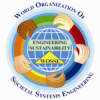Before we discuss Societal Systems Engineering, it is helpful to define Systems Engineering itself.
From Wikipedia, Systems engineering is defined as an interdisciplinary field of engineering focusing on how complex engineering projects should be designed and managed over their life cycles. Issues such as reliability, logistics, coordination of different teams (requirement management), evaluation measurements and different disciplines become more difficult when dealing with large, complex projects. Systems engineering deals with work-processes, optimization methods and tools to manage risks in such projects, and it overlaps with both technical and human-centered disciplines such as control engineering, industrial engineering, organizational studies, and project management. Systems Engineering ensures all likely aspects of a project or system have been considered and integrated into a whole.
Societal Systems Engineering is a new approach that is innovated by WOSSE (the Worldwide Organization of Societal Systems Engineers). It brings the concept of Systems Engineering into the application of societal systems and problems. We define Societal Systems Engineering as a multidisciplinary approach integrating multi-methodology based processes and control strategies, that supports the development, management and sustainability of business and Societal Systems. This model considers society as a system and business as a system within the broader societal system. The unique approach of WOSSE is in expanding systems engineering into new areas and applications through a multi-disciplinary approach; and second in defining and bridging hard systems and soft systems.
Since Societal Systems Engineering is a new area we are developing, it does not have pre-defined frameworks or methodologies that address the open-ended, adaptable, ecological, human-nature based aspects of global societal systems. WOSSE is developing these methodologies, to address human-centered systems, and particularly hybrid systems that involve traditional systems centered on technologies and human-systems.
We invite you to join as a member of the World Organization of Societal Systems Engineers..

This is very interesting. I’ve read and studied socio-political works, but have not come across a model or framework to help me plan solutions. I am interested in a way to model dependencies across institutions and demographics in the area of education.